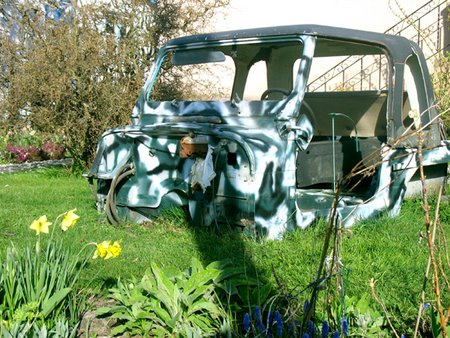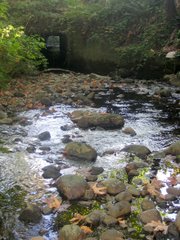Chances are most people know how to cut back on their consumption, but just in case you don't, this is for you:
1.) Change your light bulbs to CFL (compact florescent light).
They last longer, save you money (est. $40 per light life span), and if every person where to change one light in their house in North America, it would reduce greenhouse gases equivalent of removing 66,000 cars off the road. If this isn't enough incentive, well, the government also gives you 50% of the cost back to you if the light bulb is $5 or more.
www.incentivesandrebates.ca/gc
2.) Drive Less (we all know this one)
Chew on this: every 1 litre of gas you use is equal to @ 2.5 kg of CO polluting our air. Don't idle you car when you do drive, car pool, walk, bus or cycle, get some fresh air and keep it fresh too. Again, the government also gives tax breaks on bicycles and and equipment, as well as on transit monthly passes. So keep all your receipts! If we want better bus systems and cycle routes, we must support what we have now.
http://www.icarpool.com/
http://www.erideshare.com/
www.kijiji.ca/vancouver
these seem to be easy and free to join (?) (i haven't gone all the way with the trip planning)
www.incentivesandrebates.ca/gc
3.) Turn Down the Heat or A/C
By simply turning down the heat when out or at night (or in the day whatever you prefer). Just lowering a few degrees can save a lot of energy and money (and you thought you were broke - cha-ching!). Like my father used to tell me...."put a sweater on!!!" In the summer, rather than heating things up while cooling yourself down, opt for a fan instead of using the A/C. I know they don't work as well, however some newer models work decently for a fair price and without the cost of the planet. Seems like fair trade to me. If you are able to, install energy saving windows and appliances, then check out the gov.'s incentive and rebates web page (above) to get some of your hard earned cash back. Maybe even look into installing solar, it has a much better return on investment than any GIC.
4.) Save The Hot Water
Heating water is #4 on the energy drainer's guide and so easy to fix. Wash your clothes in cold (preferably) or warm. It is better for your clothes anyway. Wrap a blankie around your hot water tank. Surprisingly this can save you up to an est. 33% of hot water. (who knew saving the world could save your pocket book too?) Also make sure your tank is maintained properly.
5.) Eat Less Meat; Eat Organic
The food industry another one of the big bad polluters and consumers, especially factory farmed meat and non-organic produce. By choosing to have one or two (or more) meat-free meals a week, you save tonnes in waste water, methane, chemicals, feed, electricity, and of course one sad sorry animal's life of cruelty and pain. When you do eat meat, try to buy free range meats. They are becoming less expensive and more plentiful. Same with organic produce. I always peruse the organic isles first to see what is affordable and surprisingly, it is sometimes cheaper or at least close to the same. And it tastes better too. Delish!
6.) Be Consumer Savvy
You have buying Power - so use it. When you purchase organic, sustainable, eco-friendly products you tell manufacturers to change and create products that do not have the hidden cost of the destruction of our only home. Cotton, for example is not only the most heavily sprayed crop but also the chemicals used are some of the most toxic substances in farming. In 2000, 84 million pounds of chemicals were dumped on 14.4 million acres of US cotton fields. And you don't have to look like a hippie either (unless you want to). Lots of organic clothing companies make really funky and comfortable styles.
Check this site out for some local stores:
http://www.fashionhigh.ca/
7.) Recycle and Re-Use (as if you aren't already)
So we've been doing this for a while, Great! However many aren't. Especially businesses (and they waste a lot!). Encourage your place of work to start a recycling program. If your home or apartment building doesn't have any blue bins, find out how to get some. Look for food packages that can be recycled. Encourage coffee shops to use biodegradable cups, or even better, bring your own. The GVRD has a guide called 101 things to do with all your old stuff (and where to take it).
http://www.gvrd.bc.ca/
8.) Compost
It's easy and cheap and anyone, anywhere can do it.
http://www.cityfarmer.org/
9.) Invest Wisely
You cycle, recycle, eat organic etc. So why are you supporting Big Oil? You pay close attention to how well your investments are doing but you should also pay attention to what you are investing in. After all, what good will that $$$ be in 30, 40 years if our Earth is in shambles.
http://www.greenmoneyjournal.com/
www.sustainablebusiness.com/progressiveinvestor
10.) Write
Write to your government. Write to consumer manufacturers: Food, Cars, Clothing, etc. You don't have to be eloquent with the ink, just tell them what you like and don't like about what they are doing. Offer suggestions for change.
Welcome to Global Warming! It's Here; It's Now! So what are YOU gonna do?

Vancouver Cycling Routes
Why Not?
If anyone reading this, who perhaps knows they should do more yet for whatever reason don't, please comment. I want to know what obstacles or objections other people have. Maybe there can be solutions found for everyone.




